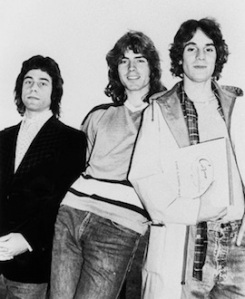Lots and lots of anniversaries today, as you twitter-ing will know: TH’s *Little Creatures,* the debut LP by a band called Duran Duran (whatever happened to them, anyway?), and I’m sure there were a couple more, too.
Talking Heads, though, and the whole aura around their artiness, began to wear on Chris Frantz and Tina Weymouth: hence the birth of Tom Tom Club, and their first single, released 34 years ago this week: “Wordy Rappinghood.”
The impulse behind the side project had everything to do with, well, David Byrne, and New York in general, according to Chris Frantz, who’s one of the real gentlemen of the music industry:
“We wanted to make a real musical anti-snob record because we’re fed up to here with all the seriousness which surrounds Talking Heads. It’s as if just by being in TH you’re expected to think very heavily about everything … We were consciously trying to get away from … being influenced by heavy philosophies and drugs and … nihilistic attitudes … it’s the only kind of emotion they can get behind in New York.”
They did, of course, draw heavily on the hip-hop aesthetic shaping New York at the time. Sessions took place in the Caribbean, and the duo were joined by Monte Brown, Steven Stanley, Adrian Belew (one of the happiest performers I’ve ever seen), and Tina’s three sisters. Their LP from much later, *Boom Boom Chi Boom Boom,* has to be one of the most underrated LPs of the late 80s. Cheers!


 Anyway: if you tried to tune in, let me offer my apologies. There were technical difficulties, of course, and I’ll post here and on twitter if in fact there is a full recording, and it’s made available. I was hoping to show off my two-tone outfit, complete with silver shark-skin jacket, but I guess the pix that night (more forthcoming) will have to do for now.
Anyway: if you tried to tune in, let me offer my apologies. There were technical difficulties, of course, and I’ll post here and on twitter if in fact there is a full recording, and it’s made available. I was hoping to show off my two-tone outfit, complete with silver shark-skin jacket, but I guess the pix that night (more forthcoming) will have to do for now.
